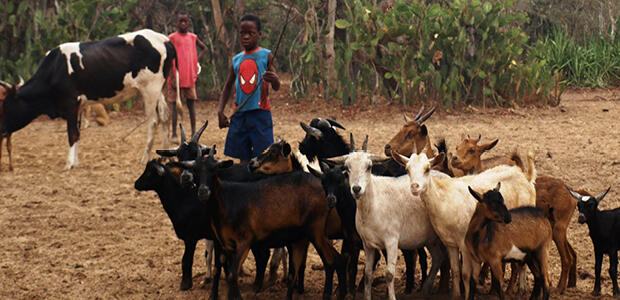Technical Note
Imputation methods for adjusting SOUTHMOD input data to income losses due to the COVID-19 crisis
This note sets out two different methods on how to adjust incomes in the microdata underlying the standard SOUTHMOD models to reflect a sudden shock, in this case the COVID-19 shock, as done in the accompanying working paper by Lastunen et al. (2021)...
Report
How COVID-19 is affecting workers and their livelihoods in urban Ghana
This survey is a collaborative project conducted by researchers of the United Nations University World Institute for Development Economics Research (UNU-WIDER) and the Institute of Statistical, Social and Economic Research (ISSER), University of...
Working Paper
Measuring earnings inequality in South Africa using household survey and administrative tax microdata
Overall income inequality in South Africa is very high, and inequality generated in the labour market is a key driver of inequality.In this paper, I use the Post-Apartheid Labour Market Series, the General Household Surveys, and administrative tax...
Research Brief
Wage inequality in post-apartheid South Africa
Much work has been done on inequality in South Africa, but to date the literature that assesses the dynamic response of income or wealth distribution to economic policy actions is almost non-existent. This information gap is caused by data...
Working Paper
Intergroup contact and its effects on discriminatory attitudes
The contact hypothesis posits that having diverse neighbours may reduce one’s intergroup prejudice. This hypothesis is difficult to test as individuals self-select into neighbourhoods. Using a slum relocation programme in India that randomly assigned...
Policy Brief
Reducing inequalities in South Africa
South Africa has the highest rate of measured inequality in the world. Often thought to be a legacy of the apartheid system, inequality in South Africa has stubbornly persisted. South Africa’s position as highest inequality country in the world has...
Working Paper
Construction and public procurement in Uganda
As it transitions to an oil-producing country, Uganda’s investments in infrastructure and physical capital will increasingly depend on the ability of the construction sector to respond to surges in demand and transform investment effort into outcomes...
Working Paper
Taking stock of South African income inequality
We synthesize the findings from several recent papers on South Africa’s very high income inequality. These papers use new datasets—including income tax data—and new empirical methods to investigate the drivers of household income and individual...
Working Paper
Earnings and employment microdata in South Africa
Traditionally, analysts of the South African labour market have used household survey data to describe earnings and employment in the post-Apartheid period. More recently, administrative data from the South African Revenue Service has been made...
Working Paper
An assessment of inequality estimates for the case of South Africa
A substantial amount of research has been conducted examining inequality in South Africa using multiple data sources. We provide an overview of this research in this paper. Furthermore, we use nationally representative survey data to estimate income...
Blog
Development programmes must capture local insights
by
Ana Horigoshi, Samantha Custer
June 2023
In the paper 'Aid reimagined: results from an elite survey on perceptions of progress, capacity, and development co-operation', we tabulated responses...
Working Paper
Empirical challenges comparing inequality across countries
This study presents new empirical results, using microdata from the LIS database, on development patterns in economic inequality for a set of countries that are less covered in the empirical literature, mostly due to the lack of appropriate data...
Working Paper
Top income adjustments and tax reforms in Ecuador
Top income under-coverage in developing countries not only leads to downward biased inequality indicators but might also affect the ex-ante evaluation of progressive tax reforms. We propose a simple adjustment to top incomes for formal employees (e.g...
Working Paper
Measuring labour earnings inequality in post-apartheid South Africa
This paper investigates the validity of household survey data published by Statistics South Africa since 1993 and later integrated into the Post-Apartheid Labour Market Series (PALMS).A series of statistical adjustments are proposed, compared, and...
Working Paper
Trust in the time of corona
The global spread of COVID-19 is one of the largest threats to people and governments since the Second World War. The on-going pandemic and its countermeasures have led to varying physical, psychological, and emotional experiences, shaping not just...
Working Paper
Measuring consumption over the phone
The paucity of reliable, timely household consumption data in many low- and middle-income countries has made it difficult to assess how global poverty has evolved during the COVID-19 pandemic. Standard poverty measurement requires collecting...
Working Paper
Institutional trust in the time of corona
We study how the stringency of policy measures to counter the COVID-19 pandemic affects individuals’ trust in formal institutions. Drawing on micro-level panel data from Germany spanning an 18-month period from the onset of the pandemic, we show that...
Working Paper
What did they say? Respondent identity, question framing, and the measurement of employment
Drawing from two labour market experiments in rural India, we offer insights on the influence of survey design on the measurement of employment. The first experiment contrasts self-reported estimates of employment with proxy-reported estimates from...
Blog
Studying food price dynamics in Mozambique – insights from the field
by
Firmino Guiliche, Elina Penttinen, Naira Materula
April 2024
In Mozambique, analysing how and why food prices change is crucial. Understanding the dynamics of price formation is fundamental to mitigate the...

 Join the network
Join the network




